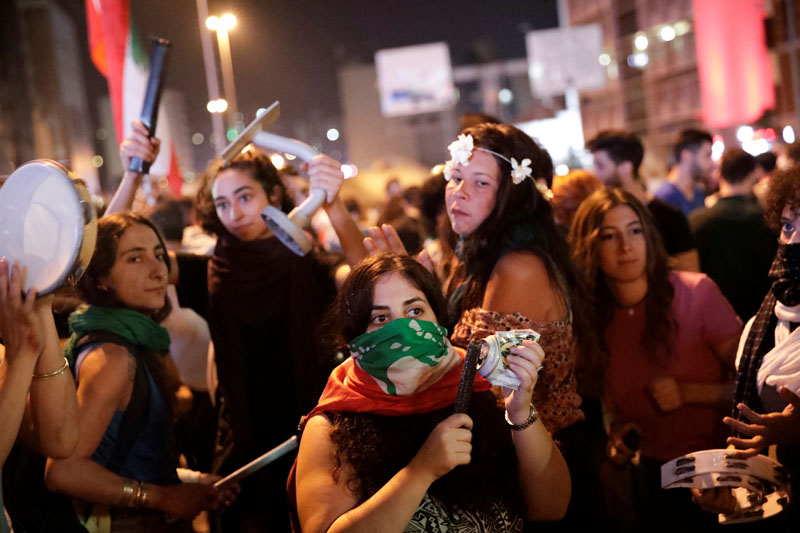Lebanon slides deeper into chaos, no sign of new government
- Main road closed around Lebanon
- President's criticisms provoke fresh protests
- Demonstrators want jobs, end to corruption
- Banks, schools closed for second day running
- Aoun urges Lebanese not to pull money from the bank
BEIRUT: Main roads across Lebanon were closed on Wednesday in fresh protests after President Michel Aoun angered demonstrators by urging them to end their revolt against corruption among the country's ruling elite.
His remarks in a television interview late on Tuesday ignited demonstrations overnight in which a protester was shot and killed after an altercation with Lebanese soldiers at a roadblock south of Beirut.
The killing marked a bloody twist to the crisis that has gripped Lebanon for nearly a month, escalating tensions in a country ensnared in a deep political and economic crisis.
The man was a follower of Walid Jumblatt, a veteran Druze politician and former civil war militia leader, who has urged his supporters to remain calm.
Schools and banks were closed for a second straight day. They have been shut for much of the four weeks since the start of the protests against political leaders seen as venal and unable to rescue Lebanon from rising poverty and unemployment.
One banker said all transfers were frozen for now.
"The reaction was very spontaneous. People felt we have to ramp up the pressure," said Joelle Petrakian, who was protesting at a blocked highway in central Beirut, describing Aoun's interview as "very dismissive".
"I think they are trying all the ways to let us cool down but on the contrary, we will not stop."
Several dozen protesters watched by troops and police sat blocking the normally busy road. Nearby lay smouldering debris ignited during protests overnight triggered by Aoun's remarks.
"Aoun ignites the intifada (uprising)," ran the front page headline in the daily Ennahar newspaper.
In his interview, Aoun indicated there was no breakthrough in talks over forming a new government to replace Saad al-Hariri's coalition cabinet. Hariri, who quit on October 29, was hesitant about being prime minister again, he said.
Aoun also said a purely technocratic government, as demanded by many protesters, would not be able to govern Lebanon and so it should include politicians.
Addressing protesters in his interview, he said, "If you continue in this way, you will strike Lebanon and your interests ... If they keep going, there is a catastrophe. If they stop, there is still room for (us) to fix things."
As Aoun's interview was ending, protesters blocked several main roads across Lebanon, some with burning tyres. Tensions flared in Beirut late into the night. In the Cola district near Beirut, dozens of men pelted stones at soldiers and a tank.
Prime Minister Saad al-Hariri called the head of the army and the police and stressed the need to protect citizens and ensure the safety of the protesters. He called Jumblatt and conveyed his condolence, his Twitter feed said.
DOLLARS "UNDER THE PILLOW"
Commercial banks, seeking to avoid capital flight, have been imposing tight restrictions on financial transfers out of Lebanon and US dollar withdrawals. The authorities have not however announced official capital controls.
Banks, which were closed for half of October during the protests, shut their doors on Tuesday and again on Wednesday in strike action by bank employees who are concerned about security risks posed by depositors demanding their money and protesters.
Aoun called on the Lebanese not to rush to the banks, saying their money was safe. He also said Lebanese were keeping dollars "under the pillow", referring to money withdrawn from banks and kept at home.
The United Nations urged Lebanon to form a competent new government better able to seek international aid and warned the country was in a critical financial and economic situation.
Hariri, who is aligned with Western and Gulf Arab states, wants to be prime minister of a technocratic cabinet that he believes would be better placed to secure urgently needed international financial support, political sources have said.
But the heavily armed group Hezbollah and its ally Amal believe Hariri aims mainly to keep Hezbollah out of government, a senior source familiar with the two Shi'ite groups' view said on Sunday.
The Iran-backed Hezbollah is classified as a terrorist group by the United States. On Monday, its leader said talks were continuing over the new government and Hezbollah wanted to leave open the way for an agreement.
Aoun, a political ally of Hezbollah, said he was awaiting answers before calling formal consultations with MPs to designate the next prime minister.






